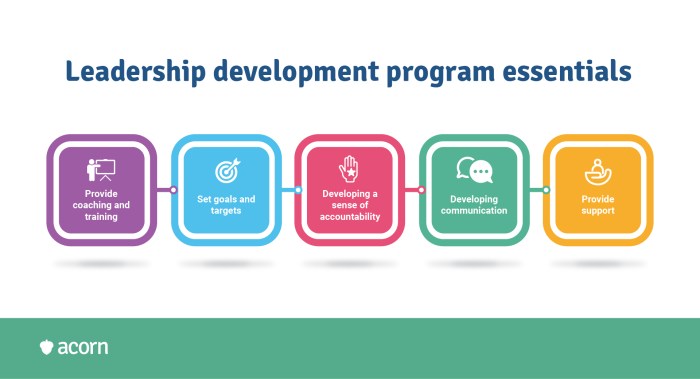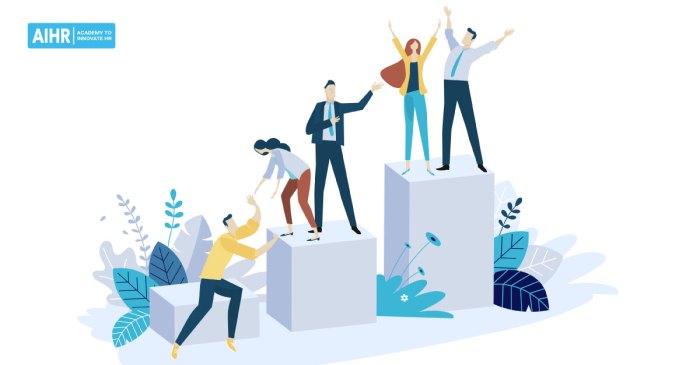Leadership Development is all about honing the skills needed to succeed in the ever-evolving world of organizations. From essential components to effective strategies, this topic delves into the core of what it takes to be a leader.
Definition of Leadership Development

Leadership development is the process of improving the skills, abilities, and knowledge of individuals in leadership roles within an organization. It is crucial for organizations to invest in leadership development to ensure that their leaders are equipped to effectively guide and inspire their teams towards achieving the company’s goals.
Main Objectives of Leadership Development Programs
- Identifying and nurturing future leaders within the organization.
- Enhancing communication and interpersonal skills among leaders.
- Developing strategic thinking and decision-making capabilities.
- Fostering a culture of collaboration and teamwork.
- Building resilience and adaptability in leaders to navigate challenges.
Contribution of Leadership Development to Organizational Success
Effective leadership development programs play a crucial role in driving organizational success by:
- Increasing employee engagement and motivation.
- Improving productivity and performance across all levels of the organization.
- Facilitating succession planning and ensuring continuity in leadership.
- Enhancing innovation and creativity within teams.
- Creating a positive work culture and boosting employee retention.
Key Components of Leadership Development
Leadership programs are designed to cultivate essential skills that are crucial for effective leadership. These programs focus on developing a wide range of abilities that are necessary for leading teams and organizations successfully.
Essential Skills Developed Through Leadership Programs
- Communication Skills: Effective leaders need to communicate clearly and persuasively with their team members to ensure tasks are carried out efficiently.
- Decision-Making Skills: Leaders must be able to make tough decisions under pressure and analyze situations to determine the best course of action.
- Problem-Solving Skills: Being able to identify and solve problems is essential for leaders to navigate challenges and obstacles effectively.
- Teamwork Skills: Leaders must be able to collaborate with team members, delegate tasks, and foster a positive team environment.
Role of Mentorship and Coaching in Leadership Development
Mentorship and coaching play a crucial role in leadership development by providing individuals with guidance, feedback, and support to help them grow and improve their leadership skills. Mentors and coaches can offer valuable insights, share experiences, and provide advice to help aspiring leaders navigate their professional journeys.
Significance of Emotional Intelligence in Effective Leadership
Emotional intelligence is a key component of effective leadership as it involves the ability to understand and manage emotions, both in oneself and others. Leaders with high emotional intelligence are better equipped to build strong relationships, inspire trust, and navigate complex social dynamics within their teams. By being aware of their own emotions and those of others, leaders can make more informed decisions and create a positive work environment conducive to teamwork and collaboration.
Strategies for Effective Leadership Development

Effective leadership development strategies play a crucial role in shaping the future success of organizations. By implementing the right tactics, companies can nurture their talent pool and ensure a strong leadership pipeline for the future. Let’s explore some successful strategies that organizations can adopt to enhance their leadership development programs.
1. Mentorship Programs
Mentorship programs are a powerful tool for leadership development. Pairing seasoned leaders with promising talents allows for knowledge transfer, skill development, and ongoing support. By providing mentorship opportunities, organizations can foster a culture of learning and growth.
2. Leadership Training Workshops
Organizing leadership training workshops can help individuals hone their leadership skills and expand their knowledge base. These workshops can cover a range of topics such as effective communication, decision-making, conflict resolution, and strategic planning. By investing in continuous training, organizations can equip their leaders with the tools they need to succeed.
3. Rotational Assignments
Rotational assignments involve moving employees across different roles and departments within the organization. This strategy helps aspiring leaders gain a holistic view of the business, develop diverse skill sets, and adapt to new challenges. By exposing individuals to various functions, organizations can identify and nurture future leaders.
4. Feedback and Coaching
Providing regular feedback and coaching sessions is essential for leadership development. Constructive feedback helps individuals identify areas for improvement and enhance their strengths. Coaching sessions can offer guidance on leadership best practices, goal setting, and personal development. By offering continuous support, organizations can empower their leaders to reach their full potential.
5. Succession Planning, Leadership Development
Succession planning involves identifying and nurturing potential leaders within the organization. By creating a clear roadmap for leadership transitions, organizations can ensure a smooth handover of responsibilities and maintain continuity in leadership roles. Succession planning also allows organizations to proactively address talent gaps and prepare for future challenges.
6. Leadership Assessments
Conducting leadership assessments can help organizations evaluate the strengths and development areas of their leaders. By identifying key competencies and areas for growth, organizations can tailor leadership development programs to meet specific needs. Assessments can also provide valuable insights for career planning and succession management.
Importance of Continuous Learning and Growth
Continuous learning and growth are essential components of effective leadership development. In today’s dynamic business environment, leaders must adapt to change, embrace innovation, and stay ahead of the curve. By fostering a culture of continuous learning, organizations can empower their leaders to navigate challenges, drive growth, and lead with confidence.
Challenges in Leadership Development
Implementing leadership development initiatives can face various challenges that hinder progress and success. These challenges often include resistance from employees, lack of resources, and a disconnect between leadership development programs and organizational goals.
Common Challenges in Leadership Development
- Resistance from employees who are comfortable with the status quo and reluctant to change.
- Lack of resources, both in terms of budget constraints and time limitations for training and development.
- Difficulty in aligning leadership development programs with the overall strategic goals of the organization.
- Identifying and nurturing the right talent for leadership roles within the organization.
Overcoming Resistance to Leadership Development
- Engage employees early on in the process and communicate the benefits of leadership development for their personal growth and career advancement.
- Provide ongoing support and mentorship to individuals participating in leadership development programs to help them navigate challenges and obstacles.
- Align leadership development initiatives with the organization’s values and culture to ensure buy-in from employees at all levels.
Examples of Successfully Addressing Challenges in Leadership Development
- Company X conducted regular feedback sessions with employees to gather insights on the effectiveness of their leadership development programs and made adjustments based on the feedback received.
- Organization Y invested in technology to enable virtual leadership development programs, overcoming the challenge of limited resources and geographical constraints.
- Business Z established a clear career path for emerging leaders within the organization, providing a roadmap for growth and development that motivated employees to actively participate in leadership programs.